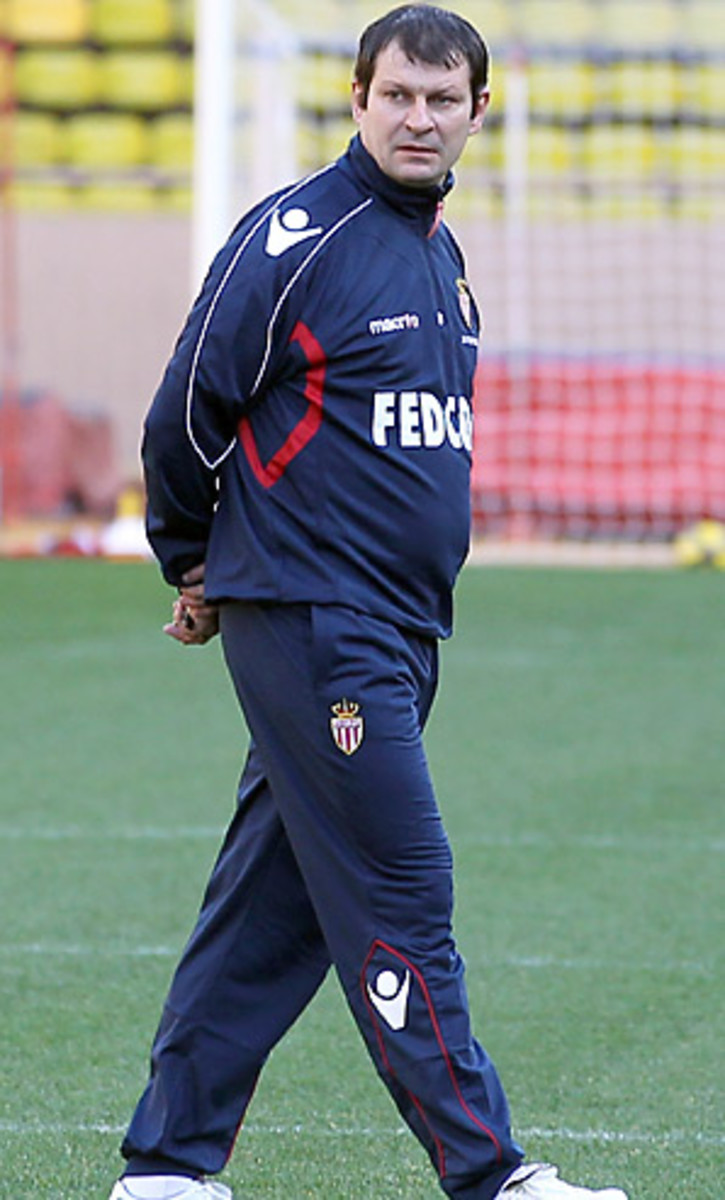
Monaco struggling for survival
Indeed, those who complain about Monaco's tax-free status affording it financial advantages -- among them, Lyon president Jean-Michel Aulas, at least when Monaco carried a threat -- have been waiting for this moment since 2003, when it was relegated by the French Professional League for amassing a €50 million ($68 million) debt. On appeal, it kept its top-flight status, but was banned from buying any players. President Jean-Louis Campora, who had been in charge for 28 years and overseen five titles, had little choice but to step aside, and Pierre Svara replaced him.
This was the backdrop to which Didier Deschamps' side, boosted by the loan signing of Fernando Morientes, reached the 2004 European final, beating Real Madrid and Chelsea on the way. It might have won the trophy had captain Ludovic Giuly not limped off after 20 minutes, when the score was 0-0. Opponents Porto went on to win 3-0. And yet behind the scenes, the club was close to meltdown. Svara had no football experience and he was paying out huge player bonuses that exceeded revenue. Far from being a glorious period, the 2003-04 season was Monaco's worst financial year in its history.
Within 12 months, Deschamps had left as coach and the club's revolving-door policy, on and off the pitch, began. Over 50 players have come and gone since then, as have six different head coach appointments and four presidents. Only one of them did not change the coach: Jerome de Bontin, in charge from April 2008 to March 2009, kept Ricardo at the helm throughout.
"When Prince Albert of Monaco called me, my mission was to save the club from bankruptcy as the financial situation was not sustainable," De Bontin told SI.com in an exclusive interview this week. The American financier cut costs, making himself unpopular by sacking sports director Marc Keller and Jean-Luc Ettori, a member of the coaching set-up who had been at the club for 32 years. "There were a lot of people there with no purpose who cost a lot of money, and I had to get rid of them."
De Bontin recouped over €20 million ($27 million) in transfer funds by selling Jeremy Menez (to Roma, for €14 million/$19M), Frederic Piquionne (Lyon, €5 million/$6.7M) and Sylvain Monsoreau (Saint-Etienne, €2 m/$2.7M) and re-invested less than €4 million/$5.4M on Alejandro Alonso from Bordeaux, and Park Chu-Young, from FC Seoul (a signing that allowed Ligue 1 to sell its TV rights to South Korea). Both players are still at Monaco, and central to its chances this season.
De Bontin also slashed the wage-bill from €28 million ($38M) to €17.5 million ($23.5M) and gave Ricardo the task of keeping the team in Ligue 1. The Brazilian finished 12th and 11th in his two seasons. "In one year there, I feel I saved the club from insolvency and left it with a competitive team with very low salaries and a coach committed to the undertaking," said De Bontin.
When De Bontin left (his appointment was always intended to be short term), he gave strict instructions to his successor, Etienne Franzi, to keep Ricardo in charge, and to not repeat the mistakes of the past by overpaying for talent. Franzi, who was in charge of Monaco's successful basketball team before it went bust in the 1970s, did not heed the advice. He sacked Ricardo, brought in Guy Lacombe, and sanctioned the loan signing of Barcelona's Eidur Gudjohnsen on a salary reported to be €3 million ($4M). He also re-appointed Keller as sports director. "The club is now in a precarious situation because it has paid too much for players and failed to build a competitive team," said De Bontin. There are fears in Monaco that Franzi will repeat the basketball bankruptcy with the soccer team this year.
Lacombe did a decent job last season, guiding the team to eighth place. Over the summer, Lacombe had persuaded Franzi to part with €7 million ($9M) to sign striker Dieumerci Mbokani from Standard Liege, but he only scored once in the first half of the season, and was dropped. The coach also fell out with Alonso, the captain, and struggled to motivate his young group of players.
And so in came Banide, a former Monaco youth player who spent 15 years coaching youngsters in the academy (and whose father, Gerard, also had two spells in charge of the first-team). Banide did well in his last spell at Monaco: when he took over in October 2006, it was in 19th position, and when he left at the end of that season, it was in ninth, seven points off third place. In 28 matches, he averaged 1.57 points per game, a record only bettered in the last decade by Deschamps (1.61). "I listened to my heart, and decided to come back to my club," Banide told a press conference last week. "The team lacks confidence, and we need everyone to perform to their full potential."
But the price of failure could prove very costly. Links between the Monegasque royal family and the club date back to the 1950s, when then-player Michel Hidalgo (who went on to become France coach) would give private coaching lessons in the Palace of Monaco gardens to Prince Rainier's son Albert, now the head of state. The Monegasque government, encouraged by Prince Albert, has financially bailed out the club before but might not be so keen to do so if it dropped to Ligue 2.
"The real challenge for Franzi and Banide is about saving the club from disappearing," De Bontin added. "If Monaco goes down, it may mean the end of the club."




